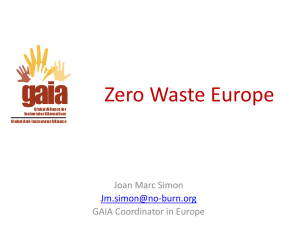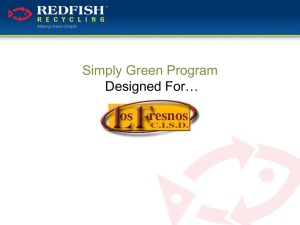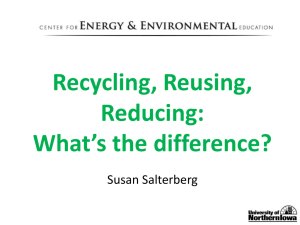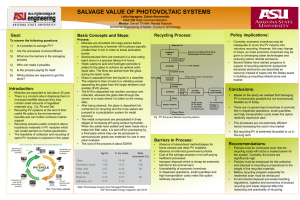Water Recycling and Regulation
advertisement
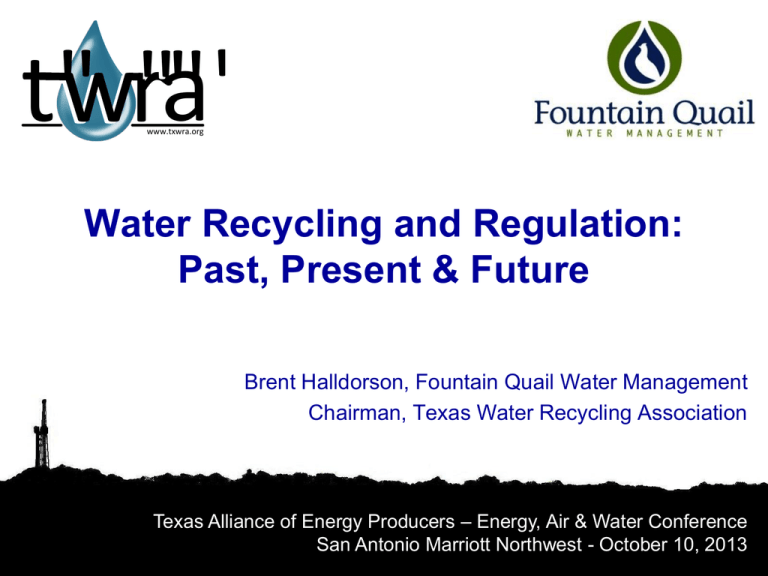
t"w w"r" "a" www.txwra.org Water Recycling and Regulation: Past, Present & Future Brent Halldorson, Fountain Quail Water Management Chairman, Texas Water Recycling Association Texas Alliance of Energy Producers – Energy, Air & Water Conference San Antonio Marriott Northwest - October 10, 2013 Discussion Points ① Hoover Dam led to the US becoming a superpower. ② Shale development = our NEW HOOVER DAM. ③ Water is the key to both (Hoover Dam and Shale Development). Hoover Dam ① Built during the Great Depression (1931-1936). ② Supplied the US with an abundance of low cost, domestic power. US Influence on the World Stage 1945. The US emerges from WWII as the largest power on the globe. Superpower Status Q: 1941. Japanese sneak attach smashes US Pacific Fleet. A: How did the US rocket to world dominance in 4 years? Low cost domestic energy played a part… WWII US Joins in 1941 - 2010 - 2000 - 1990 - 1980 - 1970 - 1960 - 1950 - 1940 - 1930 - 1920 - 1910 - 1900 Thanks to Hoover Dam the US could build more ships, airplanes and tanks than anyone. US Unconventional Oil and Gas ① US power is arguably in decline. China and India are on the rise. ② US Shales are a GAME CHANGER. ③ Low cost domestic energy (Hoover Dam) boosted the US in the past and will do it again. Manufacturing, chemical plants, etc. are all drawn to low cost, reliable power. ④ We cannot afford to screw this up – it is too important. Unconventional Shale Development Pioneered in Texas. • It all started with the Barnett Shale. • Small independents unlocked the resource. TEXAS OFFERS THE RIGHT CLIMATE • Regulatory: Regulators that understand Oil & Gas. • Politically. • Economically. The Texas economy is linked to O&G. Water Management – the Past… • • Water was viewed as an afterthought. Volumes increased over time – were simply a cost of production. UNCONVENTIONALS ARE DIFFERENT •Water is needed BEFORE the resource can be developed. •Water treatment was viewed as a science project – interesting but not integral. Water Management – the Present… • • • America is waking up to the fact that it is becoming energy independent. Water is vital to the development. Experience is becoming more important. Black Boxes are going away. RECYCLING IS BECOMING NORMAL • Water is being recognized as essential. • Supplies & disposal can be limited. • The Texas drought has raised the profile of water availability in areas like West Texas. © 2012 Select Energy Services. All materials contained in this document are confidential and proprietary to Select Energy Services, LLC and intended recipients. Water Management – the Future… • • • Water must be used more effectively to ensure continued development. Industry wide codes and best practices will emerge for water recycling. PW is becoming viewed as an asset. RECYCLING WILL BE A NORMAL PART OF SHALE PRODUCTION • Recognized leaders in this space will emerge. • Water-related businesses will be bundled (supply, transport, recycling, disposal). Water is a precious resource. The TWRA is committed to developing positive, sustainable solutions to Texas’ water challenges. The TWRA seeks to: ① Encourage water reuse and recycling. ② Protect water without adversely impacting industry. ③ Maintain and advance Texas as a global economic leader. The TWRA supports all viable water recycling technologies and their vendors. www.txwra.org New RRC Recycling Rules ① ② Very Positive. After discussion with industry and TWRA, the RRC made some very reasonable changes from earlier proposed rules. The RRC made a statement we fully endorse (Ch 3, pg. 7): “With the adoption of this rulemaking, the Commission sets up a regulatory framework in which recycling is a viable alternative to disposal, but allows the operators to make their own water and waste management decisions.” Permit by Rule This is probably the biggest win. a.If a producer re-uses their PW with no treatment or adds their own treatment (i.e.: filter) this is fine (within the oilfield). b.Why then should a permit be needed if a 3rd party performs treatment (filter or other)? Now any operator that recycles for their own reuse is essentially “permit-by-rule”. Multi-Lease, Multi-Operator The “on-lease” vs. “off-lease” stipulation was scrapped. The new definition is “non-commercial fluid recycling.” We can now recycle from multiple leases and multiple operators as long as the facility is under the jurisdiction of an oilfield operator. For example, PW from a SWD can be recycled and sold to another producer as frac supply water. Recycle to Fresh Water Standard Other jurisdictions (i.e.: Pennsylvania) were making rules to “de-waste” recycled water (WGMR-123). The TWRA viewed this as flawed logic. • The PW itself is already RCRA exempt waste. • As long as treated water meets a freshwater standard (we recommended EPA secondary drinking water standards), it should not require de-wasting as long as it remains within the oilfield. The RRC agreed. In fact, they singled out distilled water: “If the treatment of the fluids results in distilled water, the Commission authorizes any reuse other than discharge to water of the state.” Recycle to Clean Saltwater Any level of recycling in which the end product remains saltwater used to be referred to as “partial” treatment. The rules are simple. Clean saltwater is handled the same way as PW. H-11 pits necessary. Cannot use fast-line or other transfer designed for freshwater. The Big Question Saltwater or Freshwater? • • Saltwater Lower cost (minimal treatment). Difficult logistics (storage + transport) Freshwater •Higher cost (thermal distillation). •Lower risk – store and transport freshwater. Charting a Logical Path • • Saltwater Lower cost (minimal treatment). Difficult logistics (storage + transport) Freshwater •Higher cost (thermal distillation). •Lower risk – store and transport freshwater. 1 SALTWATER (BASIC) TSS/POLYMER REMOVAL ONLY RE-USE (CUSTOM) REDUCE HARDNESS, SCALING INDEX, ETC. 2 FRESHWATER IS THE COST WARRANTED? LOGISTICS. ZLD Devon NOMAD Installation – Freshwater Mobility Key to Logistics Devon’s recent water recycling locations Devon has two units operating at one strategic location: Denton Wise Lateral “C” (S Wise Co.) Past locations: Johnson Ranch (E Wise Co.) Parker Godley (W Johnson Co.) Circle R (W Johnson Co.) Tarrant Dove Hill (SW Denton Co.) McCurdy (SW Denton Co.) Spain (SE Wise Co.) Casto (SW Denton Co.) NYSE: DVN www.devonenergy.com Hood Johnson 14 Sites total (since 2004) Recycling Center – Hub for Water PAST: Disposal OR Recycling FUTURE: Disposal AND Recycling Maximize Recovery of Value-Add Products Oil ($$$) Flowback Recycling Produced Water Other Treatable Water Streams Facility Segregate, skim oil, remove solids, treat water. Distilled Water (re-use for fracs) Clean Heavy Brine (re-use for drilling) Solids + any untreatable water for disposal. Optimize & Protect SWD Capacity ROVER Permian Project – Clean Saltwater • • • Customer using PW as source water. High H2S (~200ppm) FQWM and Select put together a package deal for customer (containment, transfer and recycling). Before / After ROVER Treatment ROVER Solids Control 1 Direct re-use or “floc-ndrop” into containment. Solids build up & reduce effective volume of containment. Bacteria blooms. Lower cost initially. Expensive clean-up. 2 Remove solids prior to containment. Keep solids out of recycled water containment. 100% volume available for HF supply. Clean brine can be stored longer. Dry solids can be buried on location. ROVER Permian Project – Clean Saltwater Keep solids out of recycled water containment Prevents bacteria blooms & messy cleanup PW is now a resource New Trends Pit covers (prevent evaporation). ② Combine Recycling & Disposal (not Recycling OR Disposal). ③ More use of brackish water and saltwater – be careful about hydrogeology. ④ Have a common sense discussion with parties involved: ① ⑤ Landowners are often writing leases stating that E+Ps must buy groundwater from them. Incentivize, not mandate recycling (i.e.: TWRA). www.txwra.org

